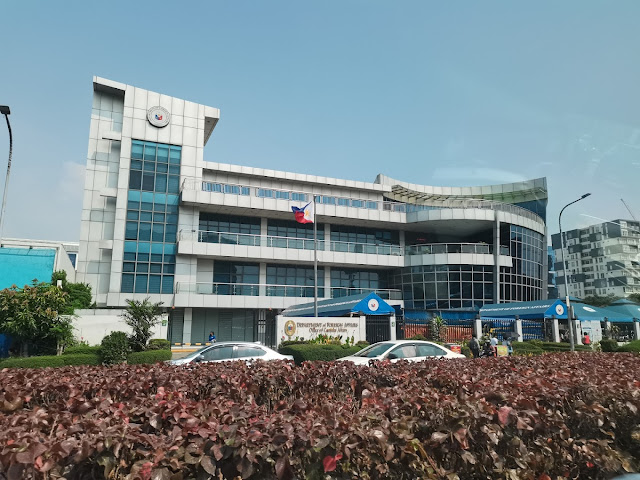The Department of Foreign Affairs (DFA), or Kagawaran ng Ugnayang Panlabas in Filipino, serves as the executive branch of the Philippine government, fulfilling vital roles such as enhancing national security, protecting territorial integrity and sovereignty, and actively engaging in global development initiatives to bolster the country's competitiveness.
Furthermore, the DFA is dedicated to safeguarding the rights and welfare of Filipinos residing abroad, incorporating them as vital partners in the nation's progress.
Additionally, the department strives to portray a positive image of the Philippines and promote a deeper international understanding of Philippine culture, fostering mutually advantageous relationships with other nations.
Loading...
DFA History
Here are the important events prior to the creation until the current functions of DFA:
Late 1800s
1898: President Emilio Aguinaldo appoints Apolinario Mabini as the Republic’s first Secretary of Foreign Affairs, marking the beginning of the DFA.
Colonial Rule and Japanese Occupation
1898-1946: The Philippines experiences colonial rule under the United States.
1942-1944: The country faces Japanese occupation.
Independence and Establishment of DFA
1946: The Philippines regains independence, including control of foreign affairs.
1946: Commonwealth Act No. 732 creates the Department of Foreign Affairs.
1946: Executive Order No. 18 organizes and operates the DFA and the Foreign Service.
Post-War and Cold War Era
1950s: DFA focuses on post-war rehabilitation, trade, and diplomatic relations.
1952: Foreign Service Act of 1952 is passed to professionalize the foreign service. 1960s-1970s: Philippines pursues international diplomacy, becomes a founding member of the United Nations, and participates in global matters.
Marcos Years
1967: The Philippines initiates ASEAN (Association of Southeast Asian Nations).
1970s: DFA promotes trade, investments, and international meetings.
1976: Foreign Service Institute is created for training.
EDSA Revolution
1986: Re-establishment of democratic government under President Corazon Aquino.
1989: Philippines becomes a founding member of APEC (Asia-Pacific Economic Cooperation).
Foreign Policy Shifts
1991: Philippines ends RP-U.S. Military Bases Agreement.
1991: Foreign Service Act of 1991 reorganizes the DFA.
Ramos Administration
1992-1998: Core priorities of foreign policy include national security, economic diplomacy, and overseas worker protection.
1996: Philippines successfully hosts APEC Leaders’ Summit.
Arroyo Administration
2001: Philippines pursues foreign policy based on nine realities.
Present and Future
2010s onwards: DFA continues to face global challenges and opportunities in the service of the Filipino people.
DFA Mission and Vision
Mission:
A. The organization’s mission is to promote and protect Philippine interests on the world stage.
B. Goals of the mission: This means that the organization works to make sure that the Philippines is respected and its needs are taken care of in the global community. They want to represent the Philippines well and make sure its interests are heard and considered in international affairs.
Vision:
A. The organization envisions itself as a strong and resilient foreign service that contributes to making the Philippines a strong and influential country in the world.
B. How the vision aligns with its mission: In simple terms, they want to be really good at what they do (the mission) so that the Philippines becomes strong and influential (the vision). They believe that by promoting and protecting the Philippines’ interests globally, they can help the country become a force to be reckoned with on the world stage.
ATTRACTIONS TO SEE IN MANILA
Klook.comDFA Address/Contact Details
Address:
2330 Roxas Boulevard, Pasay City, Philippines
Telephone:
(632) 8 834-4000
(632) 8 834-3000
8 234 3488 (For Passport Appointment Concerns)
8 651 9400 (For Passport, Authentication, & Other Consular Inquiries)
For those who haven't got a passport, read my guide for NEW PASSPORT APPLICATION.
If you are renewing your passport, go to - PASSPORT RENEWAL APPLICATION PROCESS
Attached Agencies of DFA
- Foreign Service Institute
- Technical Cooperation Council of the Philippines
- UNESCO National Commission of the Philippines
ACTIVITIES AND TOURS IN MANILA
Career Opportunities in DFA
Explore a world of career possibilities at the Department of Foreign Affairs (DFA), where diverse and stimulating opportunities await individuals passionate about diplomacy, international relations, and public service. As a Foreign Service Officer (FSO), you'll represent the Philippines abroad, engaging in diplomatic negotiations and advocating Philippine interests globally.
Moreover, the DFA offers a spectrum of administrative and support roles vital for its seamless operation, including positions in consular services, protocol, administration, and research. Delve into specialized areas such as international law, trade and economic affairs, and cultural diplomacy, among others.
By joining the DFA, you embark on a unique journey to safeguard and advance Philippine interests on the international stage, contributing significantly to the nation's global relations and diplomatic endeavors.
Conclusion
The Department of Foreign Affairs (DFA) mirrors the Philippines' transition from colonial rule to independence, marking a journey of active global engagement. Through this evolution, the DFA has emerged as a pivotal institution dedicated to safeguarding and advancing Philippine interests worldwide.
Driven by a mission to garner international respect for the Philippines and address its needs on the global platform, coupled with a vision of becoming a potent global influencer, the DFA plays a fundamental role in shaping the nation's destiny. Amidst prevailing global challenges and prospects, the DFA opens doors to diverse career pathways for individuals passionate about diplomacy and international relations, fostering their contribution to the country's development and global prominence.
Career Opportunities at Philippine Government Agencies
- Department of Education (DepEd)
- Department of Foreign Affairs (DFA)
- Department of Health (DOH)
- Department of Information and Communication Technology (DICT)
- Department of Justice (DOJ)
- Department of Labor and Employment (DOLE)
- Department of Migrant Workers (DMW)
- Department of Public Works and Highways (DPWH)
- Department of Social Welfare and Development (DSWD)
- Department of the Interior and Local Government (DILG)
- Department of Tourism (DOT)
- Department of Trade and Industry (DTI)
- Department of Transportation (DOTr)
- Metropolitan Manila Development Authority (MMDA)
- Philippine Drug Enforcement Agency (PDEA)
- Philippine Health Insurance Corporation (PhilHealth)
- Social Security System (SSS)














No comments
Let us know your thoughts!